Now is a great time for a career as an Ophthalmic Medical Technician!
Carlos, COA
 I was in high school when I made the decision to enlist in the Navy, just prior to my 18th birthday. I had one credit left in order to graduate but decided I didn’t want to go through summer school to finish and get my degree. While in the Navy, I started in a GED career-delayed program in 1986 that eventually allowed me to earn my GED while stationed in Groton, CT, in 1988.
I was in high school when I made the decision to enlist in the Navy, just prior to my 18th birthday. I had one credit left in order to graduate but decided I didn’t want to go through summer school to finish and get my degree. While in the Navy, I started in a GED career-delayed program in 1986 that eventually allowed me to earn my GED while stationed in Groton, CT, in 1988.
Read More about Carlos
I was in the Navy for five and a half years, first working in the hospital as a Senior Hospital Corpsman. In 1989, I applied for and got into an Optician School in Yorktown, VA, and was reassigned there to complete my education. I worked as an Optician until I left the Navy in December of 1991. I then worked as a Medical Assistant through 1998. Then, my sister shared my resume with a friend of hers who worked at a local eye clinic, who gave my resume to the Eyecare Manager. I was able to get an interview at the local clinic but had no idea what I was even interviewing for until the day of my interview (the position was for an Ophthalmic Assistant). My interview went really well, and I was offered the position. Now 20 years later, I feel so blessed to say I am certified and have found a career that I love. I just wish I knew about the career when I was discharged from the military!
If you are looking for a career that helps to make a difference in people’s lives, offers professional growth, the ability to take care of your family, have a regular schedule, and so much more, become an Ophthalmic Assistant!
If I can do it, you can do it!
Read Less
Colleen, COA
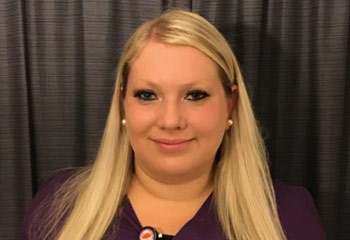
I became a mother at a very young age, 14 to be exact. My mom volunteered to watch my son so I could finish high school. After 2 weeks of leaving him with my mom, my heart could not take it; I wanted to be the one to care for him. I wanted him to bond with me. With the help of my child’s father, who was 17 himself and working a full-time minimum wage job to support our little family, I choose to stay home with my son and quit school. It was not until years later when my son was in school full-time, that I thought about getting my GED. Since I was five years old, I knew I wanted to be in healthcare, but I did not think my dream would ever come true since I was a high school dropout and a teen mom.
Read More about Colleen
I set a goal for myself. I needed to get my GED. My son’s father, my now husband, dropped me off each night to attend GED classes and I soon passed the exam and received my GED. As soon as I passed, I gained a level a confidence I never thought I would have.
My sister-in-law mentioned an opening at a small private ophthalmology practice; it had my name written all over it! They trained me on-the-job to become an entry-level ophthalmic assistant. I was immediately fascinated and thrilled with the field. I stayed with that practice for a few years until I came across a practice that would train people to become certified. I was not too familiar with certification at the time, but when I did more research into it, I quickly found out that if you were certified, you made more money. I interviewed with this practice, got the job, and a short time later, I applied for and took the Certified Ophthalmic Assistant (COA) examination, the entry level certification for the field. I passed and received my certification.
Today, I have been in ophthalmology for 12 years, my husband and I have been together 17 years, I work full-time for a very large and well-known hospital in my area and I could not be happier. I make a very good living, have great benefits, and love what I do. I am also preparing to take the Certified Ophthalmic Technician (COT) certification. I would never have dreamed that I would be where I am today.
So many practices out there are willing to train you on-the-job. If you are looking for a career in healthcare, ophthalmology will get you there!
Read Less
Stacie, COA
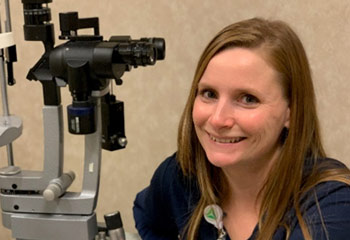
My father passed away when I was a teenager (14 years old), and my family lost everything; we were homeless for two years. Because of this, I had to drop out of high school. I gave up on doing normal things because life was so chaotic. I started working random low-paying jobs for several years, just to get by.
Read More about Stacie
When I was 24 years old, I started dating my now husband, who motivated me to go back and get my GED. I started in a program that paid for enrollees to take the GED test if they worked a certain number of hours. Although it was challenging, it was life changing. I was in a very poor state; uneducated, and without much self-esteem or self-worth. Getting my GED turned out to be my catalyst for a much higher quality of life, a more positive outlook for myself, and a better attitude allowing me to think more about what I can do rather than what I can’t do.
I next connected with a local community college that offered certificate programs. I originally wanted to become a physical therapist, but I could not afford going to school and not working. I came across a short-term 10-week program to become an ophthalmic assistant. I worked with the President of the local Community College who put together a grant for me to enroll in the ophthalmic assistant program, at no cost. My goal was to complete the ophthalmic assistant courses that would give me a better paying job, and then go back to school to become a physical therapist.
Instead, I fell in love with ophthalmology! I have been at the same practice for 9 years and have been certified since 2015. The most rewarding part of this profession to me is connecting with patients. I work in a retina clinic where we see a lot of blindness and fear, so being able to provide compassion to my patients is extremely rewarding.
If you are thinking about a career in ophthalmology, just do it! Do not second-guess yourself; believe in your capabilities. I went from making minimum wage at a job I dreaded to a career that I love!
Read Less
Valentina, COA
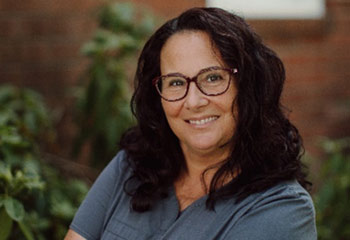
I am originally from Italy. I received my high school diploma and spent two years in pharmacology school at the University of Pisa. When I moved to the United States, my education was not recognized. I took English as a second language class, and then prepared myself to take the GED test.
Read More about Valentina
After receiving my GED, I moved to Washington State and worked several little jobs here and there. In 2002, my sister was working in an ophthalmology clinic, and a position became available for me to work there filing charts. I was very fascinated with the ophthalmology field and would frequently visit the clinic to see what types of things they were doing. One of the doctors took me under his wing and trained me on-the-job to become an ophthalmic assistant.
In this field, you are always learning. I really enjoy the daily variety and career opportunities that this profession has offered me, and I take pride in my work. Many of the ophthalmologists I have worked with throughout the years really valued and encourage(d) me to continue to learn and grow. A few years ago, I sat for the examination to become a Certified Ophthalmic Assistant (COA), the entry level certification for the field. My next step is to become a Certified Ophthalmic Technician (COT).
If you are considering a career as an ophthalmic assistant, go for it! Becoming a COA is one of the best things that has ever happened to me. This is a great field and profession, and we are in demand!
Read Less
Brenda, COT
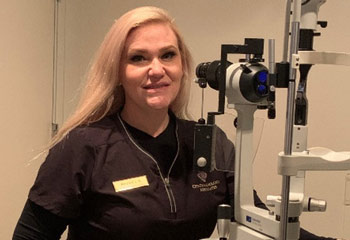
My journey in this field began in the spring of 1998 after my grandmother went to an eye appointment at one of our local Optometrist’s office. There was a “Help Wanted” sign in the window. My grandmother called me about the opportunity right when she got home from her appointment. At the time, I was 19 years old and had no real direction on what I wanted to do as far as career. I was interested in the opportunity, so I interviewed, and was offered the position as an optician.
Read More about Brenda
Optometry is where I began to learn about contact lenses and glasses. At this office, I had the opportunity to become cross-trained so I could verify insurance, schedule appointments, teach insertion and removal, measure patients for their glasses, and take histories for their examination. I worked as an optician for about a year. Although I enjoyed contacts lens management, the medical side was more appealing, so I went on to spend the next two years as an ophthalmic scribe for an amazing Optometrist and was fascinated with what I was doing.
The anatomy of the eye is so intriguing and made me want to know more about it. I found a job in general Ophthalmology where I learned the skills I had been observing and practicing with the Optometrists for years.
Then, I discovered training. It is my passion to train new hires! I love to see the light come on for new and established technicians! It took me 13 years in the field to become certified. It was the fear of failure that held me back from trying. Sometimes I look back on my work history and think “I wish I could have been in one practice this whole time” and then I remember that I would not have the realm of knowledge that I do without those experiences. I am currently a Certified Ophthalmic Technician (COT) and am interested in taking next steps to become a Certified Ophthalmic Medical Technologist (COMT). I believe anyone who is willing, driven, and passionate about their work could excel in the field of ophthalmology.
Read Less
Martin, COMT
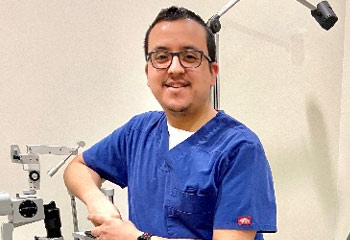
In 2012, I took my grandmother to our local eye clinic to see her glaucoma eye doctor. During her appointment I noticed that the clinic staff was training a new hire. I was very interested in seeing that someone was getting trained on the job instead of going to school for it. I asked if they were hiring and applied the same day. Three days later, I interviewed at the clinic and was offered the job at the end of the interview! I’ve always had an interest in the medical field, but I didn’t think I could work in it without experience.
Read More about Martin
I started at this clinic as a lane assistant, then became a lane technician, and once I excelled in that position, I became an ophthalmic assistant. I was very fortunate to work for a clinic that encouraged me to keep growing. I had a lot of support from the practice and the doctors to get certified; my employer paid for my study materials, the independent self-study, and for me to take the Certified Ophthalmic Assistant (COA) Examination. From the day I was hired, it took me three years to obtain my COA certification. I took the time to study and to make sure I was prepared for the examination before applying. I have now worked my way up to a Certified Ophthalmic Medical Technologist (COMT).
I am passionate about encouraging others to get certified, to continue to grow, and to discover a career that will allow them to provide for their family. Certification helps me to be more confident in what I am doing and shows patients that I have the knowledge and training to help them. Knowledge is power!
I am now working at a retina practice where they are supporting me with the resources I need to train my co-workers and to help prepare them to sit for the certification examination. I believe that this a great opportunity for them to reach their full potential. I am so grateful and fortunate for the opportunity they are giving me to help others. I am also instructing at a local training program to prepare adults to become COAs. I have had the support of staff and doctors to get me where I am today, and I want to help support others so they too can grow in their ophthalmology careers.
Read Less

